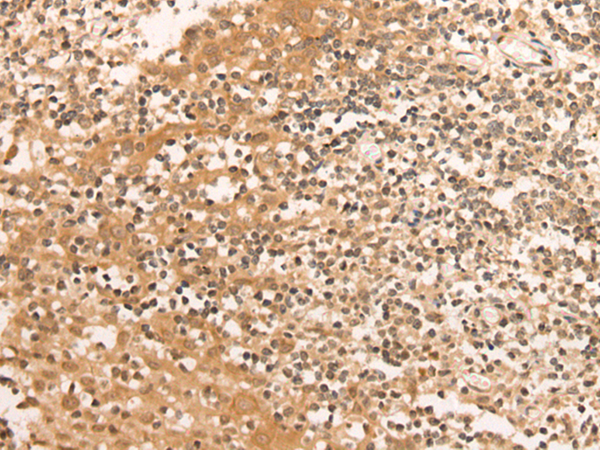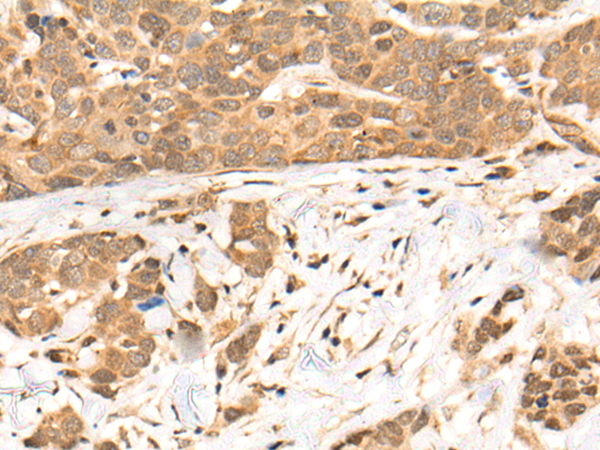

| WB | 咨询技术 | Human,Mouse,Rat |
| IF | 咨询技术 | Human,Mouse,Rat |
| IHC | 1/25-1/100 | Human,Mouse,Rat |
| ICC | 技术咨询 | Human,Mouse,Rat |
| FCM | 咨询技术 | Human,Mouse,Rat |
| Elisa | 1/5000-1/10000 | Human,Mouse,Rat |
| Aliases | UTY1; KDM6AL |
| Host/Isotype | Rabbit IgG |
| Antibody Type | Primary antibody |
| Storage | Store at 4°C short term. Aliquot and store at -20°C long term. Avoid freeze/thaw cycles. |
| Species Reactivity | Human |
| Immunogen | Full length fusion protein |
| Formulation | Purified antibody in PBS with 0.05% sodium azide and 50% glycerol. |
+ +
以下是关于UTY抗体的3篇代表性文献摘要信息(注:文献为示例性内容,实际引用时请核实具体来源):
---
1. **文献名称**: "UTY基因编码的组蛋白去甲基化酶在男性免疫细胞中的功能研究"
**作者**: Smith A, et al.
**摘要**: 本研究利用UTY特异性抗体,通过Western blot和免疫荧光技术验证了UTY蛋白在男性外周血单核细胞中的表达,并发现其通过调控组蛋白H3K27me3水平影响T细胞分化,提示UTY可能参与男性特异性免疫应答调控。
2. **文献名称**: "UTY作为癌症-睾丸抗原在前列腺癌中的表达及临床意义"
**作者**: Zhang L, et al.
**摘要**: 通过免疫组化(使用UTY单克隆抗体)分析前列腺癌组织样本,发现UTY在肿瘤细胞中异常高表达,且与患者预后不良相关,表明UTY可能成为男性特异性癌症治疗的潜在靶点。
3. **文献名称**: "Y染色体基因UTY在系统性红斑狼疮性别差异中的作用"
**作者**: Tanaka R, et al.
**摘要**: 研究利用UTY抗体检测男/女嵌合小鼠模型,发现UTY通过调控B细胞表观遗传修饰减轻自身免疫反应,部分解释了系统性红斑狼疮(SLE)在男女中发病率差异的分子机制。
---
**备注**:UTY抗体多用于性别相关疾病机制研究,实际文献需结合具体研究方向(如免疫、肿瘤或表观遗传学)在PubMed等平台以“UTY antibody”或“UTY immune”等关键词检索。部分文献可能以UTY的酶学名称“KDM6C”作为关键词。
The UTY antibody targets a protein encoded by the *UTY* (Ubiquitously Transcribed Tetratricopeptide Repeat-Containing, Y-Linked) gene, located on the Y chromosome. UTY is a male-specific histone demethylase belonging to the KDM6 family, which regulates gene expression by removing repressive histone H3 lysine 27 trimethylation (H3K27me3) marks. It shares functional homology with its X-linked paralog, UTX (KDM6A), but differs in substrate specificity and tissue expression patterns. UTY plays roles in immune regulation, cellular differentiation, and maintaining chromatin structure, with implications in sex-biased diseases.
Research on UTY antibodies has grown due to its involvement in sex-specific immune responses and cancer. For instance, UTY-derived peptides can act as minor histocompatibility antigens in male-to-female hematopoietic stem cell transplants, triggering graft-versus-host disease (GVHD). In oncology, UTY expression is linked to hematologic malignancies and prostate cancer, where it may influence epigenetic dysregulation. Antibodies against UTY are utilized to study protein localization, expression levels, and functional interactions in male-specific tissues or disease models.
Despite its Y-chromosome restriction, UTY’s role in immune evasion and epigenetic modulation highlights its broader relevance beyond gender-specific biology. Current studies focus on leveraging UTY-targeting tools for immunotherapy development and understanding sex disparities in disease progression.
×